White Collar Litigation
White Collar Litigation
by McCabe.Law Group, LLC
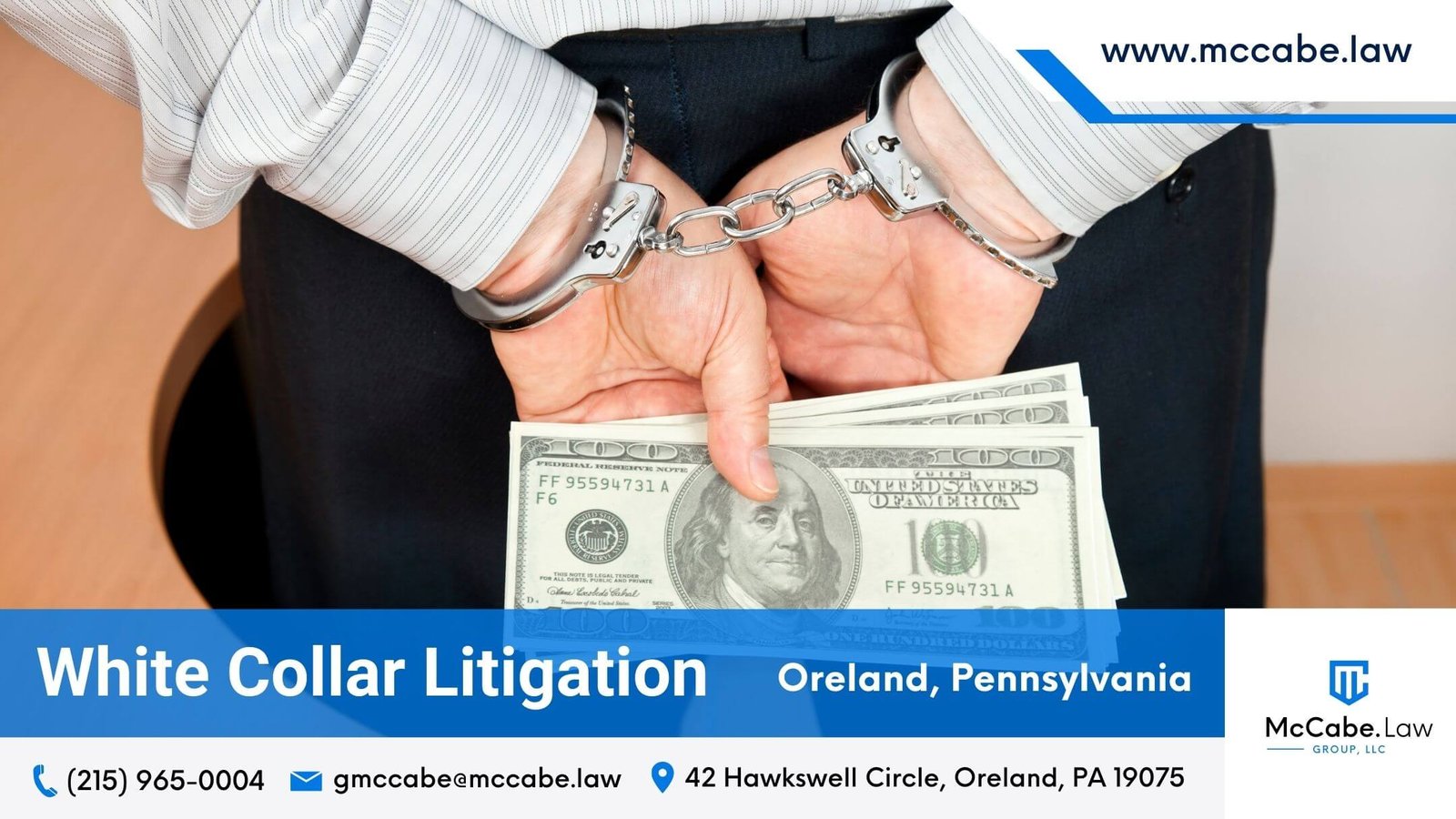
White-collar litigation refers to the judicial procedure and proceedings concerning crimes committed in a commercial or professional setting that are usually nonviolent and often include financial gain or deception. It has, but is not limited to, tax evasion, money laundering, securities fraud, insurance fraud, mail fraud, health care fraud, tax fraud, wire fraud, and credit card fraud. White-collar crimes can include individuals, organizations, or public authorities, resulting in substantial monetary penalties, incarceration, and reputational harm.
Law enforcement agencies or corporate entities may conduct internal and criminal investigations in the circumstances of white-collar litigation to find misconduct. White-collar criminal defense attorneys who advise and represent individuals or organizations facing criminal accusations will often handle the legal defense for white-collar offenses. These defense attorneys work to develop a strong defense strategy, drawing on their extensive legal knowledge and experience navigating the complexities of white-collar crime cases to minimize the impact and consequences of enforcement actions and criminal charges.
If you face the complexities of white-collar litigation in Pennsylvania, do not navigate these challenging waters alone—Gerard McCabe of McCabe.Law Group, LLC, is here to guide you through every step of the legal process.
Schedule an Appointment with McCabe.Law Group, LLC
Overview of Pennsylvania Law and White Collar Litigation
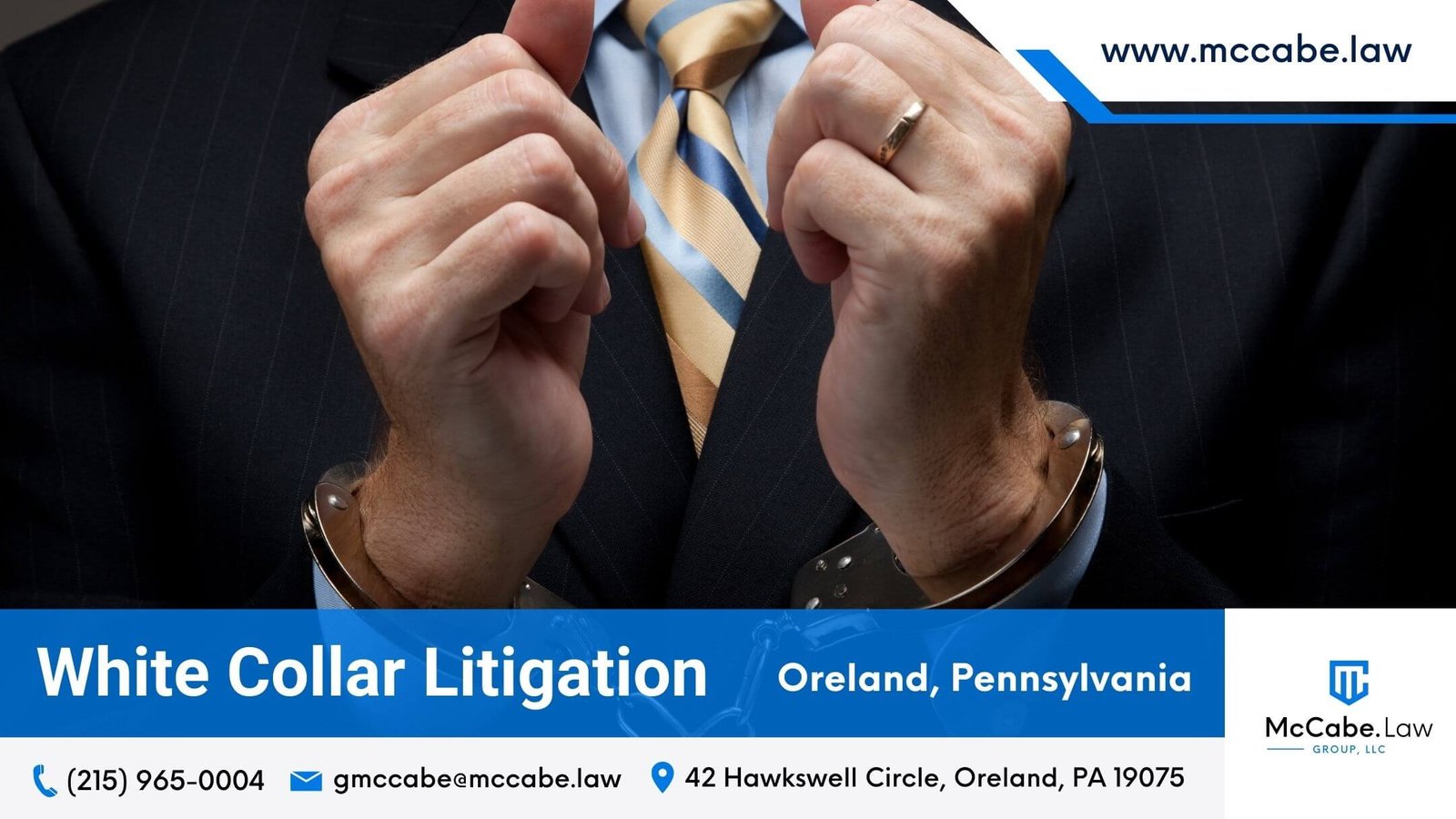
Pennsylvania law takes white-collar crimes seriously, and a sophisticated system is in place to investigate and prosecute these violations. White-collar crimes are often conducted for personal or financial gain through financial fraud, deception, or other nonviolent criminal acts.
Tax evasion, money laundering, securities fraud, insurance fraud, mail fraud, wire fraud, health care fraud, and bank fraud are all common white-collar crimes in Pennsylvania. Allegations of corporate and individual fraud are also common.
Federal and state law enforcement organizations work together to investigate and prosecute these crimes. The Federal Bureau of Investigation (FBI) and the Internal Revenue Service (IRS) are federal agencies that serve different purposes. The FBI must investigate federal crimes, while the IRS is tasked with enforcing tax laws. These authorities conduct criminal and internal investigations, often in conjunction, to collect evidence and develop solid cases against people accused of white-collar crimes.
Special laws and regulations govern white-collar offenses in Pennsylvania. These include, among other things, the Pennsylvania Crimes Code, the Pennsylvania Securities Act, and the Pennsylvania Insurance Fraud Prevention Act. These statutes lay the groundwork for prosecuting white-collar offenses and obtaining proper redress.
Individuals charged with a white-collar crime in Pennsylvania should get legal counsel from an experienced white-collar criminal attorney. Defense attorneys with solid experience in white-collar criminal defense can assist in navigating the complex legal process, protecting rights, and reaching a possible conclusion.
The Different Types of White Collar Crimes in Pennsylvania
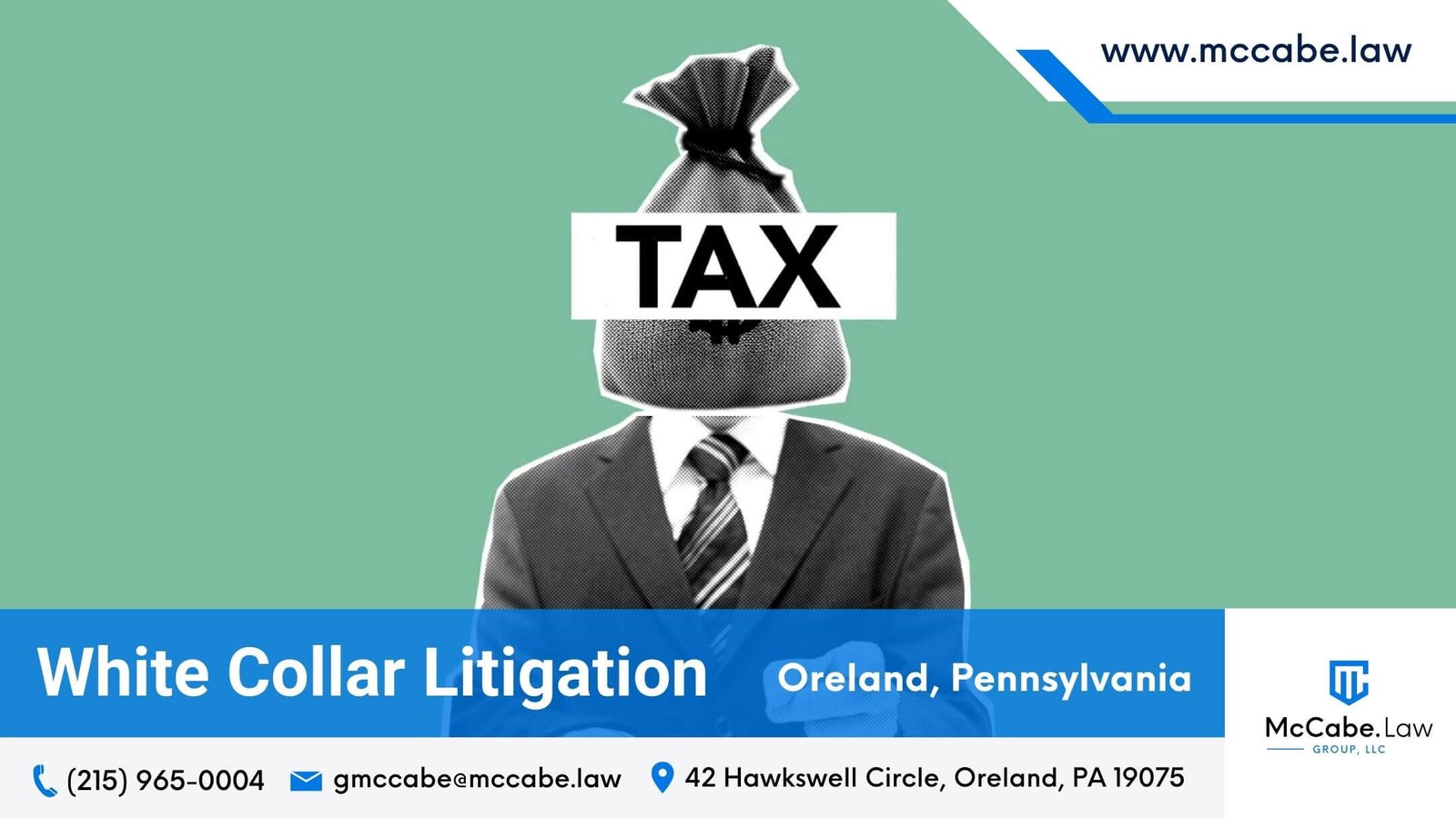
Pennsylvania has a solid legal framework for addressing white-collar crimes, including tax evasion, money laundering, securities fraud, and insurance fraud. These financially motivated offenses can harm individuals, businesses, and the economy. Law enforcement conducts thorough investigations, gathering evidence to build strong cases. Pennsylvania’s regulations, such as the Crimes Code and Securities Act, guide prosecution. Experienced white-collar defense attorneys provide crucial legal counsel and protection for those facing charges related to these offenses.
1. Tax Avoidance
Tax evasion is a significant white-collar crime that involves avoiding or dodging the payment of taxes owed to the government. Tax evasion is a criminal violation under Pennsylvania law and carries severe penalties.
Specific components must be shown beyond a reasonable doubt to be convicted of tax evasion. These include attempting to evade or fight a tax assessment, payment, or collection and the presence of a tax deficiency. Furthermore, the government must show that the defendant intended to evade or defeat the tax.
In Pennsylvania, the penalty for tax evasion can be severe. Individuals convicted of a crime may incur fines, jail, or both. The severity of the sentences might vary depending on many circumstances, such as the amount of taxes evaded, the length of the evasion period, and any prior criminal record.
Notably, innocent mistakes or neglect are different from purposeful tax avoidance. Prosecutors take ongoing or anticipated tax-violation procedures more seriously, typically resulting in harsher penalties.
The Supreme Court of Pennsylvania has delivered decisions in recent years that impact the prosecution of tax evasion cases in Pennsylvania. These decisions clarified various legal issues and provided direction on tax provisions and constitutional safeguards. To establish a solid defense and practical legal guidance in tax evasion situations, speaking with an experienced white-collar litigation attorney well-versed in Pennsylvania tax laws and recent court rulings is critical.
2. Money Laundering
Money laundering is a common white-collar crime crucial to Pennsylvania’s financial misdeeds. It refers to making unlawfully obtained funds appear legitimate by concealing their trustworthy source. Money Laundering permits criminals to profit from the proceeds of their unlawful actions while simultaneously evading law enforcement and bank surveillance systems.
There are various ways to carry out money laundering, including the employment of shell companies, offshore accounts, sophisticated financial transactions, and the incorporation of ostensibly legal investments. Individuals or organizations can use these techniques to conceal the illicit source of the money and make it almost untraceable.
Pennsylvania has had its fair share of high-profile money laundering investigations. The case of Pedro Flores, who was convicted of laundering cocaine earnings through his construction company, is one famous example. Another notable case involves Tobyhanna Federal Credit Union, where millions of dollars associated with narcotics trafficking were laundered.
These cases highlight the gravity with which money laundering is regarded in Pennsylvania and the extent to which criminals would go to justify their ill-gotten wealth. Money laundering is a serious problem for law enforcement and financial institutions, significantly influencing the economy and society.
Finally, money laundering is an essential part of white-collar crime in Pennsylvania. Its numerous tactics and high-profile cases emphasize the importance of vigorous enforcement and ongoing efforts to counteract this illegal activity.
3. Securities Fraud
Securities fraud is a serious white-collar crime with severe consequences in Pennsylvania. It entails fraudulent tactics in purchasing or selling securities, including stocks, bonds, or mutual funds, to gain financial advantage through incorrect or misleading information.
Securities fraud charges in Pennsylvania cover a wide range of criminal conduct. One prominent type is insider trading, in which individuals utilize non-public knowledge to make transactions, giving them an unfair advantage and damaging market integrity. The Ponzi fraud scheme is another standard plan in which investors are promised great returns but are rewarded with funds from new investors rather than legitimate revenues.
Securities fraud is a criminal offense in Pennsylvania, and those convicted face harsh penalties and repercussions. Significant fines, reparation payments, and severe prison sentences may be imposed. Individuals found guilty of securities fraud may also face civil penalties, such as having to disgorge ill-gotten earnings and being prevented from operating in the securities business indefinitely.
Given the complexities and severity of securities fraud cases, getting legal counsel from a Pennsylvania white-collar crime attorney with substantial understanding and experience defending against these allegations is critical. A corporate attorney can provide a solid defense by investigating the evidence, disputing the prosecution’s case, and ensuring the defendant’s rights are protected throughout the legal process.
4. Insurance Fraud
Insurance fraud is a severe offense in Pennsylvania that includes a variety of fraudulent conduct involving insurance coverage. Filing false or misleading claims, misrepresenting losses or injuries, or even utilizing someone else’s insurance without their knowledge or permission are all examples.
Depending on the gravity of the act, insurance fraud can result in being charged with either a felony or a misdemeanor. The severity of the charge is usually determined by the amount of money involved in the fraudulent act. For example, if the infraction is less than $1,000, it may be categorized as a third-degree misdemeanor, whereas sums greater than $1,000 can result in felony charges.
In Pennsylvania, the penalty for insurance fraud convictions can be severe. Fines, restitution payments, and even jail may be imposed on offenders. Individuals convicted of insurance fraud violations may also be obliged to pay the costs of their case’s investigation and prosecution.
If you are charged with insurance fraud in Pennsylvania, you must seek legal counsel from an experienced white-collar crime attorney. They can give you essential advice and help you develop a strong defense strategy to defend your rights and minimize potential penalties.
5. Wire Fraud
Wire fraud is a major white-collar crime in which electronic communications, such as phone calls or emails, are used to launch a fraudulent plan for personal gain. Wire fraud is defined in Pennsylvania law as the purposeful devising or participating in a conspiracy to defraud others through interstate wires or electronic communications to gain money or property through pretenses.
Specific components must be shown to prove wire fraud. First, there must be a conspiracy to deceive or obtain money through deception. This conspiracy can encompass a variety of fraudulent operations, such as telemarketing scams or internet investment schemes. Second, interstate lines or electronic communications must be used to aid the fraud. Electronic communication may entail using phone lines, internet services, or other electronic means.
Phishing emails, in which individuals mimic reputable businesses to steal sensitive information, and Ponzi schemes, in which investors are promised significant returns but are compensated with cash from new investors rather than actual earnings, are two everyday situations for wire fraud.
In Pennsylvania, the penalty for wire fraud convictions can be severe. Fines, reparation payments, and imprisonment may be imposed on offenders. The consequences can vary significantly, depending on how much money is involved. These consequences could mean facing several years in prison, paying substantial fines, or both.
Potential defenses in wire fraud prosecutions include lack of intent to defraud, awareness of the fraudulent scheme, and entrapment. Individuals facing wire fraud accusations should consult professional criminal defense attorneys well-versed in Pennsylvania law to develop a strong defense plan that protects their rights and interests.
6. Mail Fraud
Mail fraud is a chargeable violation under Pennsylvania law that involves exploiting the mail system to conduct fraudulent acts. Specific components must be present to establish mail fraud. First, there must be a conspiracy to deceive or obtain money through deception. This conspiracy can include sending false letters or promoting fraudulent investments over the mail.
Second, using the mail system must be a necessary strategy component. Mailing fake paperwork, bogus invoices, or counterfeit checks is one example. This part is essential to the mail fraud charge if the mail system is used to carry out fraud, further fraudulent activities, or attract victims.
Mail fraud can include sending bogus lottery notices, fraudulent prize promotions, or misleading charity solicitations through the mail. This type of fraud can also involve mailing fake bills or promotional materials.
In Pennsylvania, the consequences of mail fraud can be severe. Fines, restitution payments, and imprisonment may come from a conviction. The specific punishments vary according to the money involved, but they can range from hefty fines to many years in prison. If you are accused of mail fraud in Pennsylvania, you must speak with an experienced white-collar criminal defense attorney.
7. Fraud in the Health Care System
In Pennsylvania, healthcare fraud includes a wide range of charges, such as filing false claims for reimbursement, invoicing for services not given, and utilizing another person’s health insurance without their knowledge or agreement. These behaviors cheat insurance companies and significantly strain the healthcare system.
Pennsylvania takes healthcare fraud seriously, which can result in harsh fines. Offenders may face criminal prosecution for deceit theft, insurance fraud, or identity theft. The seriousness of the offense and the amount of money involved influence the penalty. Perpetrators may face steep fines, restitution payments, and perhaps prison time.
When facing allegations of health care fraud, it is critical to seek the advice of skilled professionals with considerable understanding in this field.
Pennsylvania Penalties for White Collar Crime
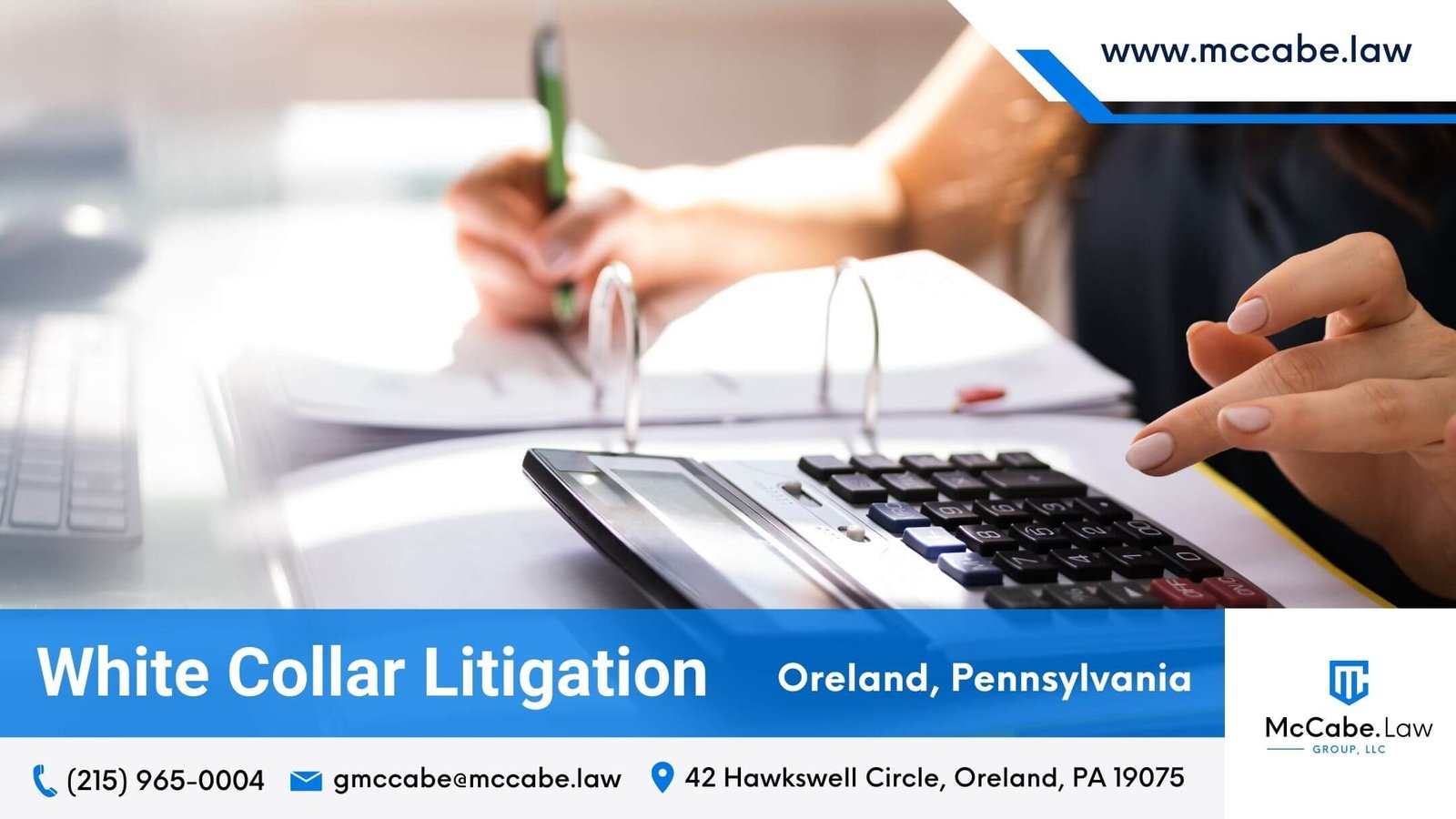
In Pennsylvania, white-collar crimes such as tax fraud can have profound implications. Those accused of such offenses may face criminal penalties, significant fines, and incarceration. The severity of the sanctions is determined by elements such as the amount of money involved, the duration of the deception, and the offender’s criminal past. A tax fraud investigation entails thoroughly studying financial records, transactions, and paperwork, with authorities such as the Pennsylvania Department of Revenue, the Internal Revenue Service (IRS), and others collaborating to find probable instances. Following the construction of a case, the prosecution will pursue charges by presenting evidence, conducting interviews, and engaging in talks or plea bargaining. The goal is to hold offenders accountable and impose punishments to deter future white-collar crimes.
Criminal Charges and Sentencing Guidelines for White Collar Crime Convictions in Pennsylvania
In Pennsylvania, criminal charges and sentencing standards for white-collar crime convictions vary based on the severity and value of the offense. Tax evasion, money laundering, securities fraud, insurance fraud, and other crimes fall into this category.
Offenses in Pennsylvania are classified into levels. The least severe charges are summary offenses, while first-degree felonies carry the worst penalties. The potential jail term and fines for white-collar crimes vary depending on the category of conduct.
Summary violations, for example, can result in a maximum penalty of 90 days of imprisonment and fines of up to $300. Third-degree offenses can result in up to 7 years in jail and a $15,000 fine. First-degree crimes have the heaviest punishments. The penalty for this violation comprises a maximum prison sentence of 20 years and the potential for a fine reaching $25,000.
It is vital to emphasize that white-collar crimes involve significant financial gains and severe penalties. Furthermore, repeat offenders may face harsher punishments. In some situations, criminals may face federal charges, which can carry much worse penalties.
If you have been accused of a white-collar crime in Pennsylvania, it is advisable to consult with a criminal defense lawyer for legal advice—Gerard McCabe of McCabe.Law Group, LLC can give a solid defense, assist in navigating the complicated legal system, and potentially decrease or obtain favorable outcomes.
Frequently Asked Questions
What are the Potential Consequences of Being Charged With a White-Collar Crime in Pennsylvania?
White-collar crimes in Pennsylvania can lead to consequences, including hefty fines, imprisonment, and damage to one’s reputation. The severity of these consequences depends on factors such as the type of offense, the amount of money involved, and any prior criminal record.
How Can a White-Collar Criminal Defense Attorney Help in These Cases?
White-collar criminal defense attorneys bring extensive knowledge and experience to the table. They can develop robust defense strategies, navigate complex legal processes, protect your rights, and work towards minimizing the impact of enforcement actions and criminal charges.
What Role Do Federal and State Law Enforcement Agencies Play in Investigating White-Collar Crimes in Pennsylvania?
Federal agencies like the FBI and IRS and state law enforcement collaborate to investigate and prosecute white-collar crimes in Pennsylvania. They conduct internal and criminal investigations, often in tandem, to gather evidence and build cases against individuals or organizations accused of such offenses.
White Collar Litigation with McCabe.Law Group, LLC
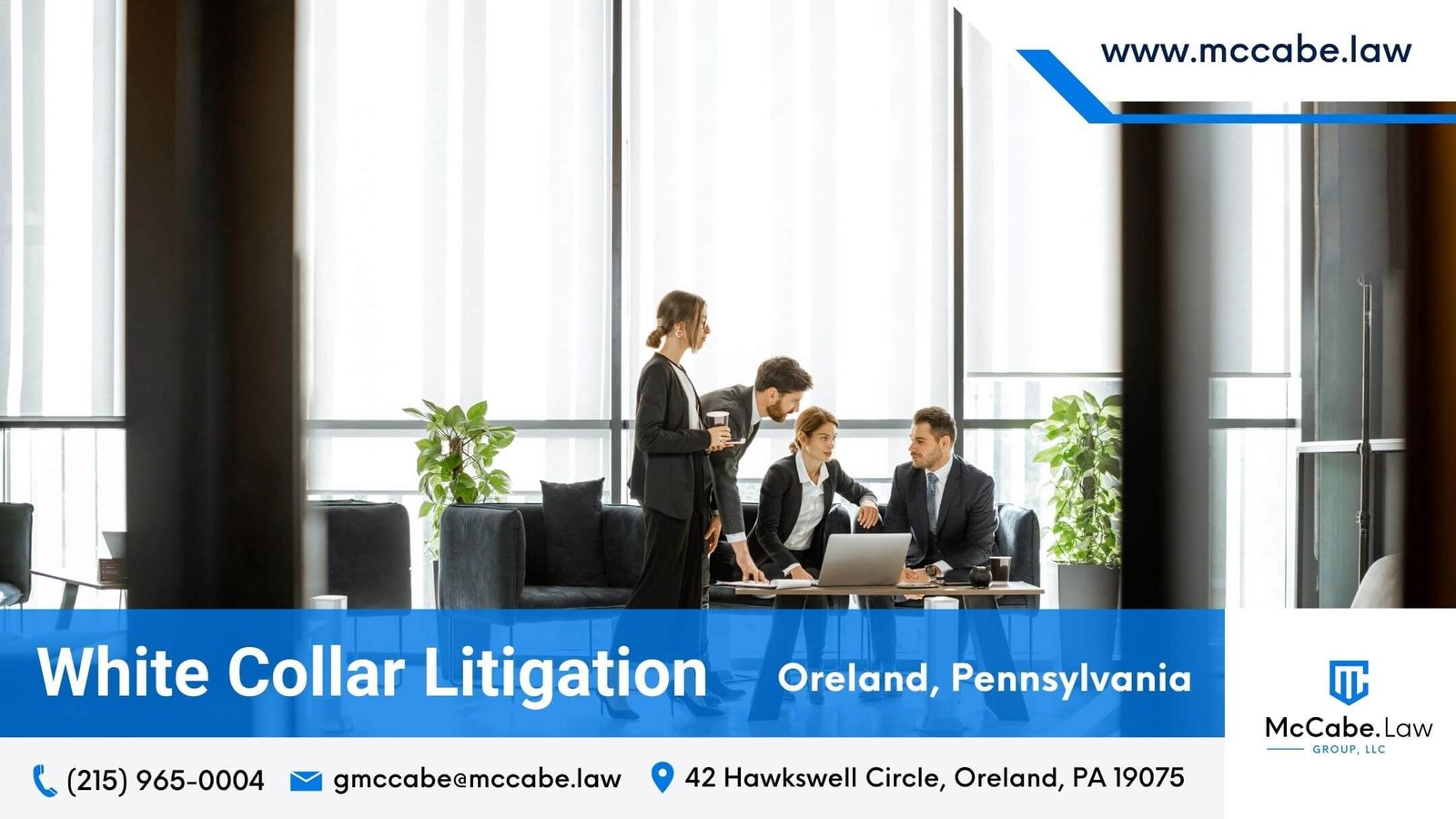
White-collar offenses like tax evasion, money laundering, and securities fraud are significant transgressions that carry substantial financial repercussions. These offenses are grouped into tiers in Pennsylvania, ranging from summary misdemeanors to first-degree felonies, each with consequences.
It is critical to highlight that white-collar crimes frequently include significant financial gains, which can result in substantial fines. Repeat offenders may face harsher punishments, and situations involving federal offenses may result in even harsher sanctions. A strong defense from competent criminal defense lawyers is critical when investigating and prosecuting white-collar crimes—Gerard McCabe of McCabe.Law Group, LLC has experience addressing many white-collar offenses. He can provide the legal guidance and counsel required to negotiate the complexities of these matters in Pennsylvania.
The Right Guidance Can Make All The Difference
McCabe.Law Group, LLC
42 Hawkswell Circle, Oreland, PA 19075
(215) 965-0004
Contact Details
- (215) 965-0004
- gmccabe@mccabe.law
- 6172 Argos Drive, Blue Bell, PA 19422
